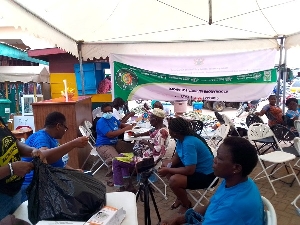Residents in Sogakope and its adjoining communities in the South Tongu district of the Volta Region have been educated on the use of anti-microbial drugs.
The public education was organised by the Veterinary Services Directorate under the auspices of the Ministry of Food and Agriculture.
The campaign is an effort by the Agriculture Ministry to create awareness and address the weakened potency of antibiotic drugs.
Held at the Sogakope on March 7, 2024, hundreds of residents were educated through a demonstration on anti-microbial resistance (AMR), how it works in living organisms, and ways to tackle it responsibly.
A veterinary technologist at the National Veterinary Service Directorate, Alberta Owusu Afriyie, said self-prescribed drug administration among livestock farmers is on the rise.
She said the situation contributes to AMR and asked the public to purchase meat from only veterinary-approved meat shops.
AMR does not only affect humans and animals but also plants.
Dr. Saviour Yevutse, the National AMR Coordinator for the Ministry of Health, said many antibiotic drugs in the country are leaving the shelves because organisms have developed resistance to them.
He said the situation in the country now is a "silent pandemic," adding that the country is investing so much in fighting against it, hence the need to join forces.
"Data shows that antimicrobial resistance is a serious issue in Ghana, and we're implementing interventions in three health approaches: animals, humans, and plants," he said.
He then lamented that "AMR is real, and we are experiencing treatment failures as a result of the system; more drugs are being phased out."
On his part, Dr. Kofi Afakye, national AMR project coordinator for the Food and Agriculture Organization (FAO), said the agency, including the World Health Organization (WHO) and the United Nations Environmental Programme (UNEP), is giving technical and financial support to countries to fight against the menace.
AMR occurs when organisms develop the ability to defeat the drugs designed to treat them, and as a result, the effort in treating diseases becomes a challenge.
The event was also used to give free medical screenings to residents.
Regional News of Thursday, 21 March 2024
Source: Albert Gooddays, Contributor

















